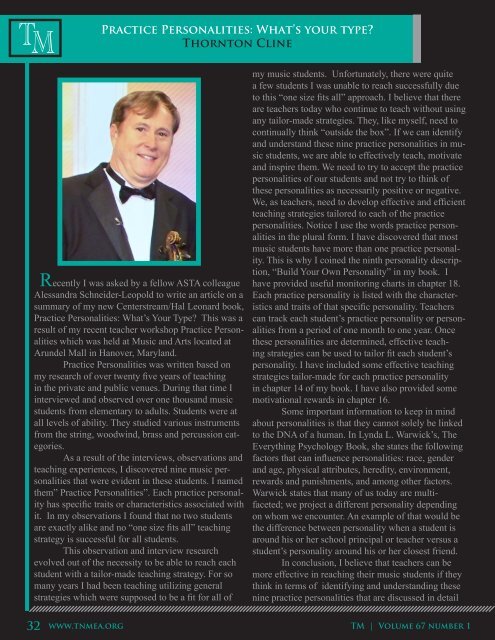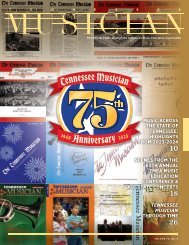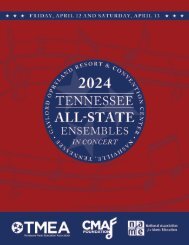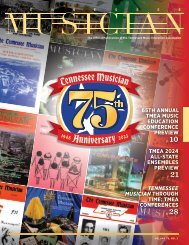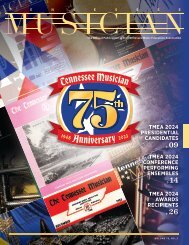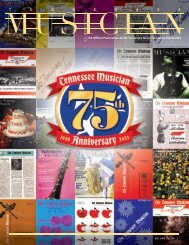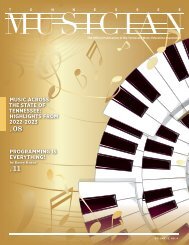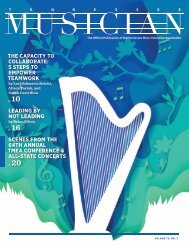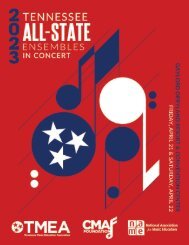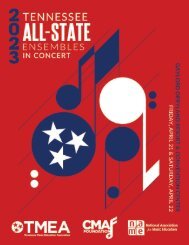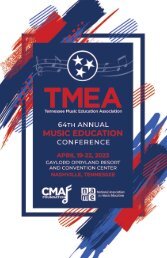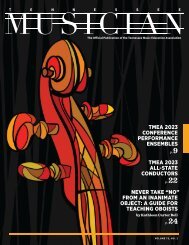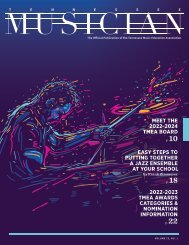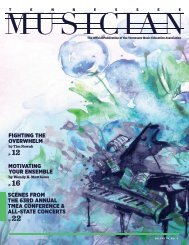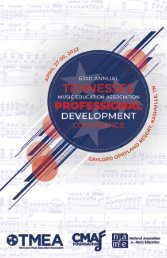You also want an ePaper? Increase the reach of your titles
YUMPU automatically turns print PDFs into web optimized ePapers that Google loves.
TM<br />
Practice Personalities: What’s your type?<br />
Thornton Cline<br />
Recently I was asked by a fellow ASTA colleague<br />
Alessandra Schneider-Leopold to write an article on a<br />
summary of my new Centerstream/Hal Leonard book,<br />
Practice Personalities: What’s Your Type? This was a<br />
result of my recent teacher workshop Practice Personalities<br />
which was held at Music and Arts located at<br />
Arundel Mall in Hanover, Maryland.<br />
Practice Personalities was written based on<br />
my research of over twenty five years of teaching<br />
in the private and public venues. During that time I<br />
interviewed and observed over one thousand music<br />
students from elementary to adults. Students were at<br />
all levels of ability. They studied various instruments<br />
from the string, woodwind, brass and percussion categories.<br />
As a result of the interviews, observations and<br />
teaching experiences, I discovered nine music personalities<br />
that were evident in these students. I named<br />
them” Practice Personalities”. Each practice personality<br />
has specific traits or characteristics associated with<br />
it. In my observations I found that no two students<br />
are exactly alike and no “one size fits all” teaching<br />
strategy is successful for all students.<br />
This observation and interview research<br />
evolved out of the necessity to be able to reach each<br />
student with a tailor-made teaching strategy. For so<br />
many years I had been teaching utilizing general<br />
strategies which were supposed to be a fit for all of<br />
my music students. Unfortunately, there were quite<br />
a few students I was unable to reach successfully due<br />
to this “one size fits all” approach. I believe that there<br />
are teachers today who continue to teach without using<br />
any tailor-made strategies. They, like myself, need to<br />
continually think “outside the box”. If we can identify<br />
and understand these nine practice personalities in music<br />
students, we are able to effectively teach, motivate<br />
and inspire them. We need to try to accept the practice<br />
personalities of our students and not try to think of<br />
these personalities as necessarily positive or negative.<br />
We, as teachers, need to develop effective and efficient<br />
teaching strategies tailored to each of the practice<br />
personalities. <strong>No</strong>tice I use the words practice personalities<br />
in the plural form. I have discovered that most<br />
music students have more than one practice personality.<br />
This is why I coined the ninth personality description,<br />
“Build Your Own Personality” in my book. I<br />
have provided useful monitoring charts in chapter 18.<br />
Each practice personality is listed with the characteristics<br />
and traits of that specific personality. Teachers<br />
can track each student’s practice personality or personalities<br />
from a period of one month to one year. Once<br />
these personalities are determined, effective teaching<br />
strategies can be used to tailor fit each student’s<br />
personality. I have included some effective teaching<br />
strategies tailor-made for each practice personality<br />
in chapter 14 of my book. I have also provided some<br />
motivational rewards in chapter 16.<br />
Some important information to keep in mind<br />
about personalities is that they cannot solely be linked<br />
to the DNA of a human. In Lynda L. Warwick’s, The<br />
Everything Psychology Book, she states the following<br />
factors that can influence personalities: race, gender<br />
and age, physical attributes, heredity, environment,<br />
rewards and punishments, and among other factors.<br />
Warwick states that many of us today are multifaceted;<br />
we project a different personality depending<br />
on whom we encounter. An example of that would be<br />
the difference between personality when a student is<br />
around his or her school principal or teacher versus a<br />
student’s personality around his or her closest friend.<br />
In conclusion, I believe that teachers can be<br />
more effective in reaching their music students if they<br />
think in terms of identifying and understanding these<br />
nine practice personalities that are discussed in detail<br />
32 www.tnmea.org<br />
TM | <strong>Vol</strong>ume <strong>67</strong> number 1


